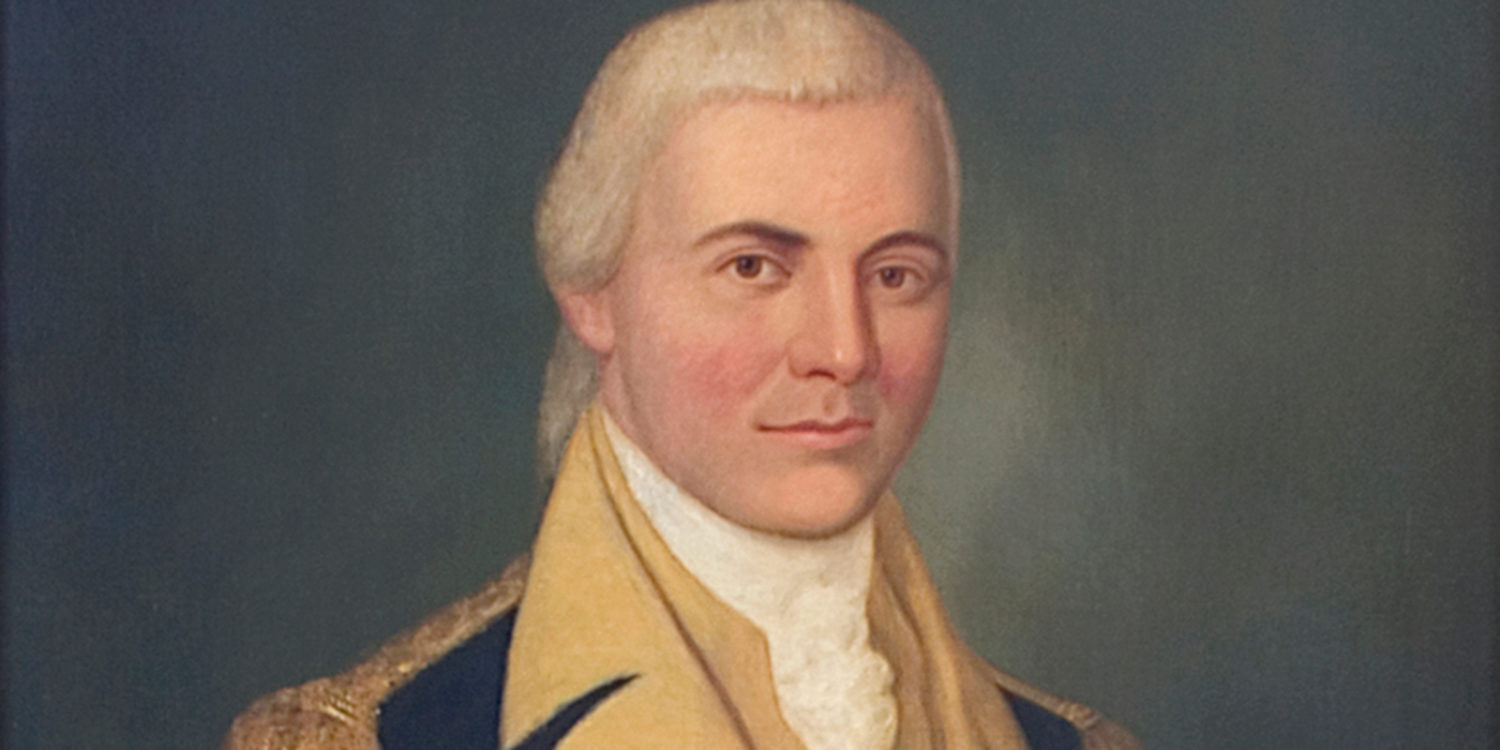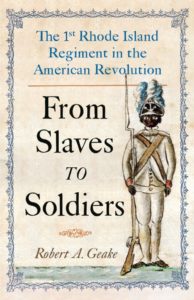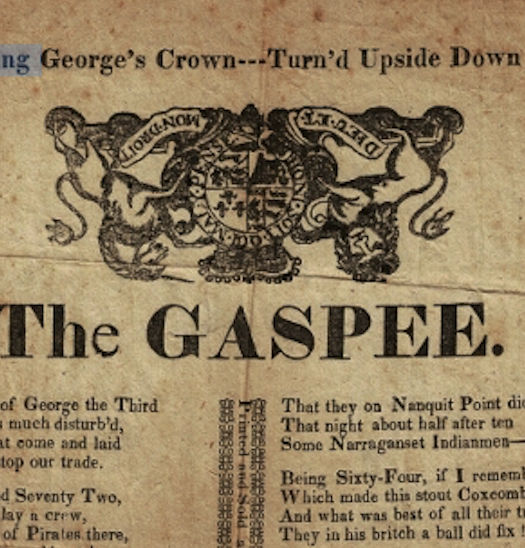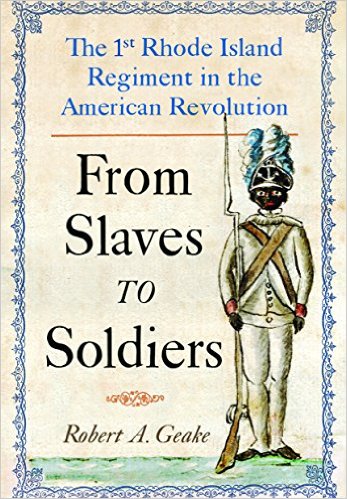In the glory of victory, within the early histories of the American republic, only a handful of heroes were chosen for public adulation and heroic mention. One of these heroes was General James Mitchell Varnum, a Rhode Islander distinguished not only for his leadership in battle, but also for his empathy toward the common soldiers under his command.
Little was made of the common soldier in those days, perhaps because so many served. Most of those farmer’s sons, laborers, and tradesmen who had eagerly enlisted and survived their terms of service returned home. But many of these veterans were still due wages, and had difficulty finding jobs in post-war America. Some soon fell into poverty and had to petition the state for assistance.
As Wilkins Updike of North Kingstown would write in his memoir of Varnum and his times, “The veteran soldiery who had exposed themselves to tempests and battles through the whole contest, and whom peace had dismissed with laurels, returned to their families penniless and clamorous.”[1]
The Federal government continued to struggle to gain revenue from the states in order to pay for the pensions of soldiers as well as other debts. This inability to secure revenue currencies to be printed by various states. Rhode Island, in particular, became infamous among the thirteen states for issuing paper money that was not worth anything near its face value.
This crisis would culminate in an effort by the Continental Congress to impose an Impost—a tax on foreign imports to the states. In February 1781, it was agreed to send an Article to the states approving the Federal levy of a 5 per cent duty on imported goods, naval prizes, and exported goods. The merchants, who had clamored for revolution through newspapers like the Providence Gazette, and had incited mob gatherings and incidents like the burning of the Gaspee off Warwick, now declared war upon the tax proposed by the new republic. This opposition flew in the face of James Mitchell Varnum, a state representative to Congress and a major proponent of the measure.
A resident of East Greenwich and a founder of the Kentish Guards, one of the earliest militia’s formed after the Gaspee incident, Varnum had risen to become a brigadier general in the Continental Army and a major general in the Rhode Island state militia. As a general in the Continental Army, he put forward the historic plan to construct a regiment composed of slaves currently bound to Rhode Island masters. His proposal to General Washington, which was written in the winter of 1777 at Valley Forge, would become, at least to one historian, a document deserving of a place in the history of the long emancipation of blacks in America.
The Rhode Island general’s plan was approved, and in the spring of 1778, the 1st Rhode Island Regiment was formed. While the black men enlisted fell short of a full regiment, the addition of young white soldiers and indigenous men, especially with the consolidation in 1781 of the 1st and 2nd Rhode Island Regiments, made up the first integrated regiment in the Continental Army.
Varnum’s career in the Continental Army ended in the spring of 1779, and shortly thereafter, he was appointed by the General Assembly as Major General of the state’s militia, allowing him, but for his limited militia responsibilities, to practice law from his home once again, on Pierce Street in East Greenwich. It would be the former general’s zeal for constitutional law that would embroil him in the tempest that occurred as the new country sought to seat a representative Congress and to form the laws that would unite them.
Varnum accepted his appointment to the Continental Congress in 1780, even while expressing his dissatisfaction with the current Congress and the Articles of Confederation. He could foresee the day, he wrote Governor William Greene, when the Congress as constructed within the Articles of Confederation would be dissolved entirely, “unless a change of measures shall render their authority more respectable.”
Under the Articles of Confederation, Congress had no ability to tax United States citizens. Under the proposed Impost, Congress could require states to contribute funds to the national effort. Despite Congress’s struggles to obtain needed financial support from the states, many citizens of Rhode Island were steadfast in their opposition to any Federal imposition on the states, as a violation of those state’s own rights. Each state levied duties to pay the Federal government, but this was inconsistent, and as Rhode Island historian William Staples observed, its success was uncertain, since a state legislature could amend the duties to reflect the state’s own interests.
Varnum believed that only a strong Federal government could manage the reserves it would take to pay the new nation’s debt, particularly those debts owed to veterans and France, the ally that had helped the fledgling United States obtain its independence. The struggle was to convince the states to accede to Congress’s demands.
In October of 1781, Governor Greene wrote to the new Superintendent of Finance, Robert Morris, that Rhode Island had already given its share of cost during the Revolution, and that the legislature was understandably cautious about the impost, as “at present we are unable to determine upon the utility of that measure, as the revenue arising therefrom, within this little state would not be worth collecting.” Greene promised to “wait until our sister states have adopted the same….”
This, of course, only delayed debate on the issue, setting up a series of attacks back and forth by Varnum, whose epistles in the Providence Gazette were signed as “Citizen” and attorney David Howell, whose scathing rebukes of the arguments for a Federal tax were signed using several names, including “A Freeman” and “A Farmer.”
Many Rhode Islanders agreed with the rhetoric stirred up by Howell’s letters, inundating the Gazette’s offices with mail. One signed “A Countryman” warned that “Money in the hands of a Sovereign Executive Power, to be raised and disposed of at will, may be and often is the instrument of tyranny; but in the hands of a free and generous people is the safeguard of their rights and privileges.”
Another writer spelled it out in plainer prose as to why the Federal government should leave the states to their own devices:
Taxes are now assessed and collected by the people themselves, IN THEIR OWN WAY, and to enter in THEIR OWN treasury, to be devoted to such purposes as THEY THEMSELVES shall direct… What can we promise ourselves then, when eight times our proportion is assessed upon us, to be collected by STRANGERS, accountable to we know not to WHOM (for in the line of taxation, we know no power but our own representative body).
This was the crux of the Rhode Islander’s argument, that if a tax were to be instituted, it should be imposed on and collected by Rhode Islanders and used in their communities as the state representatives saw fit.
Assemblymen in Rhode Island framed an alternative plan to any proposed tax: the sale of newly acquired western lands. In his book Rhode Island and the Union, Irwin Polishook noted, “Rhode Islanders had the dream that an enormous revenue might arise from the sale of western lands, perhaps enough to liquidate the costs of the war,” as well as provide bonuses, in land grants to those who had performed military service.[2]
While still waiting for those states that had still to “furnish the Congress with substantial security,” Congress authorized the Paymaster General to settle all accounts, and issued certificates for half-pay to waiting pensioners. These certificates in turn, became the cause of controversy when speculators, including merchant brothers Nicholas and John Brown of Providence, took advantage of desperate veterans by issuing loans on Continental certificates with exorbitant interest, or buying the certificates outright at a fraction of their face value.[3]
As early as June of 1784, a committee was enjoined by the Rhode Island General Assembly, and in September, presented “An Act for the support of the paupers, who heretofore were slaves, and enlisted into the Continental Battalions.”
The Assembly’s solution was to place the care for these veterans in the hands of the town from which they enlisted, declaring that “it shall be the duty of the town council of the town where such Indian, negro, or mulatto, who was heretofore a slave, and enlisted in the Continental battalions as aforesaid;…to direct the overseers of the poor of such town to take care and provide for such….”[4]
Over this period, numerous veterans, dependents, widows, and children of Revolutionary War veterans were also “warned out,” of their local community. This was the case with Nancy Hull and Sally Saltonstall. In her “examination” before the Providence Town Council on October 8, 1785, Hull testified that she “came to Providence with Briton Saltonstall about New Years’ 1783 but was never married to him. She then had a child by him . . . Sally Saltonstall.”
The child’s father Britton Saltonstall had enlisted in the 1st Rhode Island Regiment in March of 1778, and served for five full years. Saltonstall was discharged on June 28, 1783 “with a pention”, and was among those “invalids” who had received a coat in November of 1783 for their infirmaries. Like many others, he had suffered frostbite during the ill-fated Oswego Expedition in upstate New York in 1781. Records show that Saltonstall continued to live in the Providence area, and apparently was unable to support his former partner and daughter. Instead, Nancy Hull and her child were removed to New York, which was “adjudged to be their last lawful place of residence.”[5] Saltonstall would not receive a large payment until March of 1789; he received another lesser payment a year before his death in 1816.
Another unfortunate case concerned veterans Nathan Jones and Prime Brown. As a young man of sixteen and the slave of Gideon Brown, Prime Brown had enlisted for service in 1775 from the agricultural community of Johnston.[6] He is listed on the 1777 Rhode Island military census. After joining the 1st Rhode Island Regiment, he was listed in later musters as Prime or Primus[7], and he served until the 1st Rhode Island Regiment was disbanded in December 1783.
“Nathan” Jones, as he is registered in the Regiment book, also enlisted from Johnston and left $100.00 in silver with his former owner Benjamin Waterman for the care of his children, should he fail to return. Jones died on January 9, 1782, while still enlisted in the army. He left a widow, Eunice Phenix, and two children.
After the war, Prime Brown returned to Providence and took in the widow of Jones and at least one of his children. At some point in the next few years, while living with Brown, Eunice Phenix also died.
In April 1787 the Providence Town Council met to discuss the fate of Margaret Abbee, alias Margaret Harris, the common law sister-in law of Nathan Jones. Margaret was born in North Providence, married Tobias Harris, the servant of Christopher Harris of Providence, and moved to the city to live with her husband. By 1787, however, Margaret and her two children found themselves destitute and at the mercy of the town.
After the Council heard her case, the Town Clerk was ordered to write to the Town Council of Johnston and inform it of the “one Hundred dollars Silver Money” left for the dependents, and duly warned the family out of town.
Margaret Harris told the Council of another likely “chargeable” resident of the town, the seven-year-old daughter of her deceased sister Eunice, who had lived, and left the child with, Prime Brown. The town investigated and, as the child named Kate Jones was determined not to be Brown’s, ordered the seven-year-old removed to Johnston, where she had been born.[8]
The life of Prime Brown thereafter took a downward spiral. He was apparently destitute and possibly homeless in November of 1819, when he was “found dead in a lot near the Friends Boarding School.” Brown, who is listed as “colored,” was determined to be “about 70 years of age.” He was in fact eighty years old, and his brief obituary made no mention of his military service.
Such a tragic outcome underscores the gamble that many took in enlisting for war in exchange for freedom. Poor relief undertaken by each town was not an efficient or caring system for suffering veterans.
For James Mitchell Varnum, the failure of Congress to pass any measure of support for the nation’s veterans was perhaps its greatest failure during his lifetime. He foresaw the dissolution of the Congress under the Articles of Confederation and the Constitutional Convention that would bring about the forming of the governmental structure we know today. Varnum was among those who fought most strongly with the legislature in the June 1787 session to send delegates to the convention in Philadelphia. When the Assembly proved divided on the issue (embraced by the House but overwhelmingly disapproved in the Senate) Varnum wrote from Newport to the President of the Federal Convention:”
Permit me, Sir, to observe that the measures of our legislature do not exhibit the real character of the state. They are equally reprobated and abhorred by gentlemen of the learned professions, by the whole mercantile body, and by the most respectable farmers and mechanics. The majority of the administration are composed of a licentious body of men, destitute of education, and many of the void of principle. From anarchy and confusion they derive a temporary consequence, and this they endeavor to prolong by debauching the minds of the common people, whose attention is wholly directed to the abolition of debts, public and private.
Despite Varnum’s disputes with the “paper money “ party in the state’s legislature, he was among the delegates sent to the Convention. Varnum served a year, and then was appointed to the post of Federal Judge of the Ohio territory and moved to the town of Marietta, reportedly traveling the more than 800-mile trek on horseback. It was there that he died in 1788 without ever seeing his wish for Federal support for the veterans truly fulfilled. The idea of a Federal tax to pay such debts had become stalled and stagnant in the Congress, like the flow of the “great and sluggish river” by which he now lived, and whose “deadly exhalations,” in Wilkins Updike’s words, surely contributed to his death at the young age of forty-one.
As for his fight for relief for the thousands of veterans of the Revolutionary War who were now elderly, and often destitute, it was not until 1818 when Congress formally assumed the responsibility for providing funds for then destitute “soldiers of the revolution.”
[Banner Image: James Mitchel Varnum, by John Nelson Arnold, 1870 (Brown University Portrait Collection)] [1] Updike, Wilkins, Memoirs of the Rhode Island Bar (Boston, MA: Thomas H. Webb & Co. 1842), p. 168. [2] Polishook, Irwin H., Rhode Island and the Union 1774-1795 (Evanston, IL: Northwestern University Press 1969), p. 61. [3] Bartlett, John Russell, ed., Records of the State of Rhode Island and Providence Plantations, vol. 9 (Providence: General Assembly, 1865), pp. 485-487. [4] Ibid. [5] Ibid., vol. X, p. 95. [6] See “A List of Slaves Inlisted Into The Continental Battalions And To Whom They Belonged 1778,” Rhode Island Roots, Journal of the Rhode Island Genealogical Society, vol. 6 No. 3 (1980), pp. 56-57. See also Sidney S. Rider, An Historical Inquiry Concerning the Attempt to Raise a Regiment of Slaves by Rhode Island during the War of the Revolution (Providence: privately printed, 1880). [7] I have determined that the two names are the same man. In muster rolls there is only Prime, and mainly Primus from 1778 on. Oddly there is a record of Prime Brown, private, having died on January 10,1782 on the “Register of Casualties,” but Primus Brown remains on record until the end of the war, and is officially furloughed on December 25, 1783. [8] Mathew, Linda L. “Gleanings from Rhode Island Town Records: Providence Town Council Records, 1770-1778,” Rhode Island Roots, Journal of the Rhode Island Genealogical Society, Special Bonus Issue (April 2006), p. 99.


























